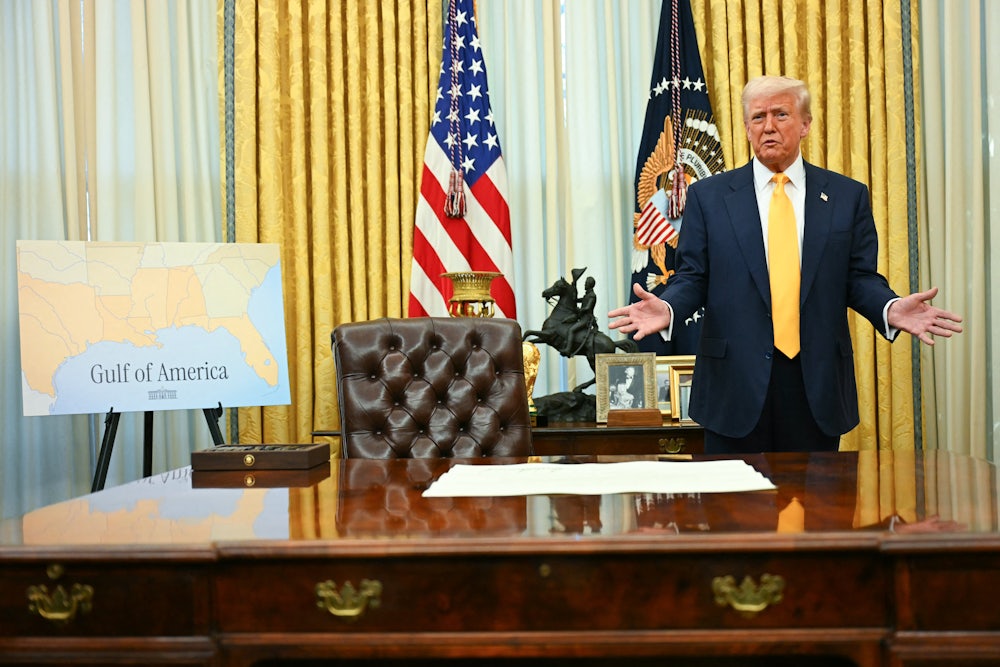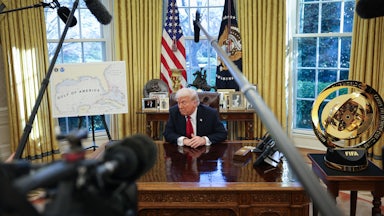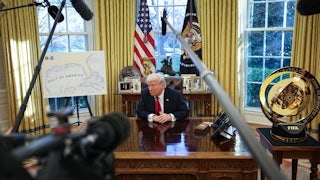When NASA astronauts Butch Wilmore and Suni Williams splashed down last week after more than nine months in space, they landed in more than just water—they landed in a live demonstration of how quickly media organizations will bend to political pressure.
The body of water where their capsule touched down has been called the Gulf of Mexico for over 400 years. But since Trump signed an executive order renaming it the “Gulf of America” earlier this year, news outlets have suddenly found themselves navigating turbulent editorial waters, revealing quite a bit about their institutional backbone in the process.
Oliver Darcy at (the always excellent) Status captured this phenomenon perfectly in his analysis over the weekend. “When news anchors tiptoe around the name Gulf of Mexico,” he wrote, “it’s not just semantics—it’s a glimpse at how the press starts to flinch under political pressure.” Darcy pointed out how this kind of linguistic control is a classic authoritarian tactic: “In China, Taiwan doesn’t exist—at least not as a country. On official maps, it’s a province. The government enforces strict language about Taiwan’s status, shaping how its people—and the rest of the world—talk about it.”
What makes this particularly unsettling is how quickly television news organizations capitulated. As Darcy noted, a review of transcripts revealed “an alarming reality: not one of the outlets could muster up the courage to simply refer to it as the Gulf of Mexico, the water feature’s name since the 16th century.” Instead, they performed “linguistic gymnastics” to avoid angering Trump while also not fully embracing his invented terminology.
On ABC News’s World News Tonight, anchor David Muir referred to “spectacular images from off the coast of Florida.” NBC’s Lester Holt spoke about astronauts “splashing down off the Florida Gulf coast.” CBS Evening News simply called it “the Gulf.” And CNN’s Jake Tapper took a more explanatory approach, noting that the U.S. government calls it the “Gulf of America” but the rest of the world still refers to it as the Gulf of Mexico.
Darcy could only find one instance where a journalist used “Gulf of Mexico” on air. NBC’s Tom Costello briefly called it that before quickly backtracking: “Six hours from right now, there will be a splashdown in the Gulf of Mexico,” he said, before correcting himself. “Sorry, however you want to call the Gulf. It will be splashing down in the Gulf.” This self-censorship speaks volumes about the climate of fear that has already taken hold.
Print media outlets, at least, showed slightly more backbone—though the spectrum of responses is telling. The Associated Press and The Washington Post took the clearest stance. The AP referred to the body of water as the Gulf of Mexico on first reference, later explaining Trump’s renaming order. The Post didn’t even bother to mention the renaming, simply calling it the Gulf of Mexico throughout its coverage.
This decision wasn’t without consequence. The AP’s refusal to fall in line led the Trump White House to limit its reporters’ access to the Oval Office and Air Force One, resulting in a lawsuit. This is exactly what makes the AP’s decision so important—they knew the likely consequences and stood their ground anyway.
Then there were those who took the coward’s way out. The New York Times and CBS News employed geographical gymnastics to avoid choosing sides, referring to “waters off the coast of the Florida Panhandle” and “Florida’s Gulf Coast near Tallahassee,” respectively. This is classic Times behavior—finding a way to appear neutral while actually making a political choice. By refusing to call it either the Gulf of Mexico or the Gulf of America, they’re tacitly acknowledging the political pressure without having to take a stand. It’s the journalistic equivalent of “I don’t want to get political”—which, as we all know, is itself a political position.
USA Today went full compliance mode, referring to it as the Gulf of America with a brief explanatory note: “Dolphins are often seen in the Gulf of America, recently renamed by President Donald Trump from the Gulf of Mexico.” This might seem like a small concession, but it’s not. It’s essentially allowing a president to redefine geographic reality through executive fiat. The fact that they so readily adopted the new terminology speaks volumes about their editorial independence.
The New York Post’s coverage of Tapper’s comments reveals the true nature of this renaming: It’s not about geography; it’s about power. The conservative outlet gleefully reported on Tapper’s careful distinction as a “brief nod to the Trump administration,” while highlighting CNN’s supposed attempt to “strike a more balanced approach” under new leadership—which apparently means avoiding terms that might upset the president, even if those terms have been in use for centuries.
To be clear: This isn’t about a name on a map, but about the willingness of news organizations to bend to political pressure, and what that means for the future. As Darcy writes, “If American journalists flinch at merely calling a centuries-old body of water what it has always been known as, what will they flinch at next?” He’s absolutely right to point out that “this isn’t saying that anyone should write a piece that’s like, ‘Here at the Trump rally, I stand among thousands of uniquely evil beings!’ because that’s not the point—and they’re not uniquely evil, they’re people.”
What’s particularly concerning is that this isn’t happening in a vacuum. Trump has openly talked about annexing Canada, seizing control of the Panama Canal, taking Greenland, and claiming the Gaza Strip. The Gulf of Mexico renaming looks suspiciously like a test balloon—seeing how much resistance he’ll face when making larger territorial claims.
The most disturbing part is how quickly this linguistic capitulation happened. We’re not talking about years of pressure—this happened within months of Trump taking office. If they can’t even call the Gulf of Mexico by its name, how can we trust news organizations to stand firm on matters of constitutional rights, democratic norms, or international law?
As Darcy concludes, “It may seem like a small choice—one name on a map—but capitulating on the issue is a crack in the Fourth Estate’s foundation. And cracks, well, they have a way of spreading.” I couldn’t have said it better myself.










